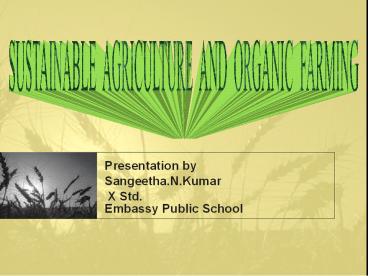SUSTAINABLE AGRICULTURE AND ORGANIC FARMING - PowerPoint PPT Presentation
Title: SUSTAINABLE AGRICULTURE AND ORGANIC FARMING
1
SUSTAINABLE AGRICULTURE AND ORGANIC FARMING
Presentation by
Sangeetha.N.Kumar
X Std.
Embassy Public School
2
Content
- Introduction
- Farming Types
- - Chemical farming
- - Organic farming
- Chemical Farming
- - Advantages
- - Disadvantages
- Organic Farming
- - Components
- - Principles
- - Methods
- - Advantages
- - Disadvantages
- Case Study
- Comparative Study
- Statistical Data
- Conclusion
3
INTRODUCTION
- Agriculture
- Soil requirements
- Minerals
- (N, P, K)
- Organic matter (Humus)
4
FARMING TYPES
- Mainly two types of Farming
- Chemical Farming
- Organic Farming
5
CHEMICAL FARMING
- Lays emphasis on use of Chemicals
Disadvantages
Advantages
Nutrient specific Rapid results High yields
Pollution Soil quality Eutrophication Ground
water pollution Biomagnification
6
ORGANIC FARMING
A production system which avoids the use of
synthetic fertilizers
COMPONENTS OF ORGANIC FARMING
7
PRINCIPLES OF ORGANIC FARMING
- Biodiversity
- Sustainability
- Natural Plant Nutrition
- Natural Pest Management
- Integrity
8
METHODS OF ORGANIC FARMING
- Organic Pest Control
- Soil Quality
- Biodynamics
- Vermiculture
- Earthworm The Natural Bioreactor
- Vermicompost
9
ORGANIC FARMING
ADVANTAGES
DISADVANTAGES
- Natural Resources remain intact
- Pollution hazards
- Use of Organic Wastes
- Employment opportunities
- Generate Original Eco system
- Lower Investments
- Not Nutrient Specific
- Labour
- Timely vigil
10
CASE STUDY
- CASE 1
- Name of plant Tulsi
- Scientific name Oscimum sanctum
- Height 1-1.5ft.
- Plant type Herb
- Leaf type Variegated, reticulate venation,
Dicot - ANALYSIS
- A frail tulsi plant was taken as a sample
study. It was observed for a period of 24 days.
It was supplied with an Organic preparation in
addition to wastes supplied to it. - OBSERVATIONS
- The plant was observed to recover within
the stipulated time. - CONTROL
- A plant treated with chemicals
- INFERENCE
- Organic inputs were found to be more
effective. The soil treated with Organic
preparation was found to be of pH 6.1 while the
one with chemicals was tested for 4.5
11
CASE STUDY
- CASE 2
- Name of plant Toor
- Scientific name Caganus cagan
- Height 3 ft.
- Plant type Annual
- Leaf type An oval leaf blade, reticulate,
Dicot,
Legume - ANALYSIS
- A toor plant was taken as a sample study.
It was observed for a period of 6 months. The
plant was supplied with an Organic preparation in
addition to Organic wastes supplied to it. - OBSERVATIONS
- The plant was a success as a perennial crop
by supplying three yields. The grains were found
to be sweet , large in size. It also recorded an
extra growth of 5ft. - CONTROL
- A plant supplied with chemicals.
- INFERENCE
- Organic inputs were found to be more
productive and economical. The soil with Organic
inputs recorded pH 6.0 whereas that treated with
chemicals recorded a pH of 5.2
12
COMPARATIVE STUDY
- Chemical Farming
- Use of chemicals
- Eco unfriendly
- Nutrient specific but hazardous
- The farmer spraying the chemicals is affected.
- Uneconomical
- Not sustainable
- Organic Farming
- Discard of chemicals
- Eco friendly
- Nutrient specific, non hazardous
- Does not involve chemicals so no side effects.
- Economical
- Sustainable
13
COMPARATIVE STUDY
- Organic Farming
- Higher Nitrogen fixation
- High microbe activity
- Less loss of nutrition
- SUSTAINABLE
- Chemical Farming
- Nitrogen reduced
- Reduced microbes
- High Nutrition loss
- UNSUSTAINABLE
- Chemicals are eco unfriendly while organic wastes
are easily decomposed.
14
STATISTICAL DATA
- COUNTRY
- Sweden
- Australia
- USA
- Uruguay
- Germany
- Italy
- OF LAND UNDER ORGANIC CULTIVATION
- 19
- 11
- 00.2
- 04
- 04
- 08
15
CONCLUSION
- Organic Farming is Nature friendly.
- It is soil sustaining.
- THUS ORGANIC FARMING
- CAN BE CONSIDERED THE
- MOST SUSTAINABLE FORM OF AGRICULTURE.
16
THANK YOU































